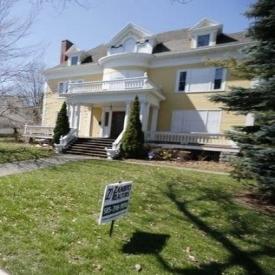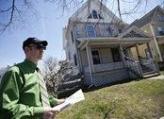Batavia in Regional News
Block by block, Batavia pursues an innovative strategy of giving tax breaks for the daunting task of bringing houses back to life

Peeling gray paint crackles under Jason Molino’s feet as he steps onto a front porch. Time has weighed down this old Victorian. The porch sags. The flap on the empty mailbox is open. No one has been home for years.
But Molino sees potential. It might just be right for Batavia’s latest housing experiment.
This old home on the corner of Ross and Ellsworth could be in any city across upstate. Call them what you want: Zombie homes. Abandoned properties. Houses, stuck in bureaucratic limbo, that crumble before the neighbors’ eyes.
Molino, Batavia’s city manager, can take you on a tour and point out the boarded windows and peeling siding. The roof flaps on one house. Streaks of soot from a fire mark another.
They can seem like impossible problems, eroding neighborhoods and vexing city inspectors.
But in this city of more than 15,000, halfway between Buffalo and Rochester, Molino is upbeat. He sees hope in their bones. He points out the original woodwork in one, a stained-glass window that’s still intact.
Two years ago, he took his staff to an abandoned properties summit and came back with ideas: Take stock of the problem. Beef up code enforcement. Connect neighbors through block clubs.

“Street by street,” Molino will tell you about the city’s strategy. “Block by block is really much more manageable.”
But no matter how hard they work to force property owners and banks to care for vacant properties, there is still this problem: The cost of buying and fixing up some of these older homes that have sat vacant for years can be more than what a property will be worth once the rehab is complete.
What homeowner would take on that burden?
So Molino took an idea to Albany: Why not offer tax breaks to those who fix up and move into abandoned homes?
With support from the City Council and help from the New York State Conference of Mayors, Batavia got special permission from the state to offer what looks like a pretty nice incentive for those willing to take on the task. Fix up a single-family house that has been vacant for years, and the owners, as long as they’re living in the home, won’t have to pay property taxes on the increased value for as much as 25 years.
Batavia is not the first to use tax breaks to entice people to fix up and live in vacant properties. But it is the first to craft what some see as a unique tax exemption designed to help fill the gap between what a housing rehab will cost and what a home will be worth after the project is done. If it works, other cities may follow in Batavia’s path.
“If you don’t provide this exemption, as a general rule, these properties will never be redeveloped,” said Wade Beltramo, general counsel for the Conference of Mayors, who helped spark the idea for Batavia’s new tax exemption. “Their values will never be increased.”
You might not expect tiny Batavia to be a leader in housing innovation. But this is not the first time the city has found a creative solution to a stubborn neighborhood problem. Ten years ago, it began transferring vacant houses acquired through tax foreclosure to Habitat for Humanity of Genesee County.
Those houses, Molino said, were the worst of the worst, homes too far damaged for most families to salvage on their own.
“No one’s going to take it, and if they do, it’ll turn into an income property,” Molino said. “They’ll put a marginal level of investment into it, and it just won’t do the neighborhood any good.”
With Habitat’s resources – volunteer time, skilled help, contractor donations – they have completely revamped 10 vacant homes for families in the last decade.
“It just takes a few people with the right mindset to a make a transformation like this,” said Jessica Maguire-Tomidy, CEO of Habitat for Humanity of Genesee County. “And I think we certainly have that in one another here.”
These are no easy solutions. Zombie homes are going to haunt neighborhoods across New York for years. But it will be cities such as Batavia that are trying inventive solutions that are going to find a way forward.
House by house, Molino said, block by block. It might just make the difference.

